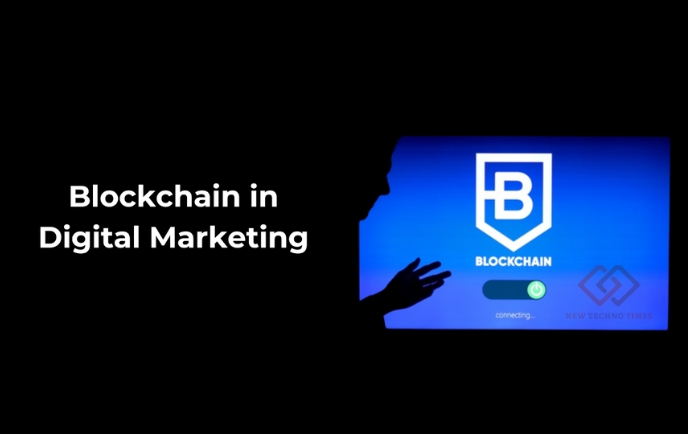Blockchain in digital marketing refers to the utilization of blockchain technology within the realm of marketing and advertising. Blockchain, at its core, is a decentralized, distributed ledger technology that records transactions across a network of computers in a secure and transparent manner.
Blockchain technology in digital marketing aims to address issues related to transparency, security, fraud prevention, and user privacy. While the adoption of blockchain in marketing is still evolving and faces challenges such as scalability and regulatory concerns, its potential to transform various aspects of the digital marketing landscape is significant.
In the context of digital marketing, blockchain can bring about significant changes and innovations in various areas:
Blockchain in Digital marketing:
Blockchain technology is poised to revolutionise a number of industries, including digital marketing. It can address several challenges present in the digital marketing landscape, such as transparency, fraud prevention, data security, and user privacy. Here are some ways blockchain can impact digital marketing:
Transparency and Trust:
Blockchain enables a transparent and immutable record of transactions. In digital marketing, this means greater transparency in ad transactions, allowing advertisers to track ad placements, ensuring authenticity, and reducing ad fraud.
Blockchain’s decentralized nature enables transparent and immutable record-keeping. In digital marketing, this transparency can be utilised to track and verify the origin and authenticity of ad impressions, clicks, and conversions. Advertisers can ensure that their ads reach the intended audience, reducing ad fraud and increasing trust between advertisers and publishers.
Also Read: Exploring the Role of Artificial Intelligence in Data Management Software
Eliminating Intermediaries:
Blockchain can facilitate peer-to-peer interactions without the need for intermediaries. Smart contracts enable automated transactions, eliminating middlemen and reducing costs associated with intermediaries in digital marketing processes like ad buying and selling.
Data Security and Privacy:
Blockchain’s cryptographic principles can enhance data security and privacy. It offers a secure way to store and verify user data, allowing individuals to have more control over their personal information while reducing the risk of data breaches.
With blockchain’s cryptographic features, user data can be stored securely and privately. Users can have more control over their data, choosing which information to share with advertisers or platforms while maintaining anonymity and reducing the risk of data breaches.
Tokenization and Rewards:
Blockchain allows the creation of tokens or cryptocurrencies that can be used as rewards for user engagement in marketing campaigns. This incentivizes user participation and engagement.
Blockchain enables the creation of tokens or cryptocurrencies that can be used as rewards for user engagement. This incentivizes users to interact with advertisements or share their data with marketers in exchange for tokens, creating a more engaging and mutually beneficial relationship between advertisers and consumers.
Content Verification and Intellectual Property Rights:
Blockchain technology can be used to confirm the legitimacy and ownership of digital material. This helps protect intellectual property rights, prevent content piracy, and ensure that creators receive proper attribution and compensation for their work.
Blockchain can be used to verify the ownership and authenticity of digital content. This can prevent content piracy and ensure proper attribution and compensation for creators.
Supply Chain Transparency:
In influencer marketing or product advertising, blockchain can be used to track the entire supply chain, providing consumers with transparent information about the origin and journey of products or services.
Ad Campaign Analytics:
Blockchain-based systems can provide more accurate and reliable analytics by collecting and processing data from verified sources. This can assist marketers in gaining deeper insights into consumer behaviour and campaign performance.
Also Read: SEO vs PPC: What’s the Best Online Advertising Strategy for Business?
Smart Contracts and Automation
Smart contracts, self-executing contracts with predefined conditions, can automate processes in digital marketing, such as payment distribution among stakeholders based on predefined criteria, reducing the need for intermediaries.
Improved Customer Insights
By securely collecting and processing data from verified sources, blockchain can provide more accurate and reliable analytics, offering marketers deeper insights into consumer behaviour and preferences.
Few more ways in which blockchain technology can impact digital marketing:
Ad Targeting and Personalization:
Blockchain Technology can enhance the accuracy of user profiling and targeting by allowing individuals to have control over their data. Users can selectively grant access to their information, enabling marketers to create more personalised and targeted advertising without compromising user privacy.
Micropayments and Content Monetization:
Blockchain enables micropayments, allowing users to pay small amounts for specific content or services. This can revolutionise content monetization models, enabling creators to receive direct payments for their work without the need for intermediaries.
Fraud Prevention and Ad Verification:
The decentralized nature of blockchain makes it more resistant to fraudulent activities like click fraud, ad fraud, and fake impressions. It helps verify the authenticity of ad inventory and ensures that advertisers get what they pay for.
Blockchain’s immutability and transparency can be utilised to verify the authenticity of ad inventory, preventing ad fraud such as bot traffic, click fraud, or fake impressions. This ensures that advertisers get what they pay for and helps maintain the integrity of digital advertising.
Customer Loyalty Programs:
Blockchain-based loyalty programs can enhance customer engagement and retention by offering transparent and secure reward systems. These programs can be interoperable across various businesses, allowing users to accumulate and use rewards across different platforms.
Decentralized Identity Verification:
Blockchain can provide a secure and decentralized system for identity verification. This can be particularly useful in digital marketing for verifying the identities of users or customers without relying on centralized entities, enhancing security and reducing identity-related fraud.
Consent Management and GDPR Compliance:
Blockchain-based solutions can streamline consent management for user data, ensuring compliance with regulations like GDPR (General Data Protection Regulation). Users can have more control over their data, and compliance can be more transparently demonstrated through blockchain records.
Also Read: The Importance of Traceroute in Diagnosing Network Issues
Ad Blockers and Content Monetization:
Blockchain can introduce new models for content monetization that bypass ad blockers. By rewarding users directly for consuming content, creators can generate revenue even if traditional ads are blocked. While these applications showcase the potential of blockchain in revolutionizing digital marketing, it’s essential to acknowledge that widespread adoption will take time. Collaboration among stakeholders, addressing technical challenges, and establishing industry standards are crucial steps toward realizing the full potential of blockchain in digital marketing.

Kishore Senthil is a Digital Marketing Executive. He designs marketing strategies with the intention of using high-quality content to educate and engage audiences. His specialties include social media marketing specialist, SEO, and he works closely with B2B and B2C businesses, providing digital marketing strategies that gain social media attention and increase your search engine visibility.

